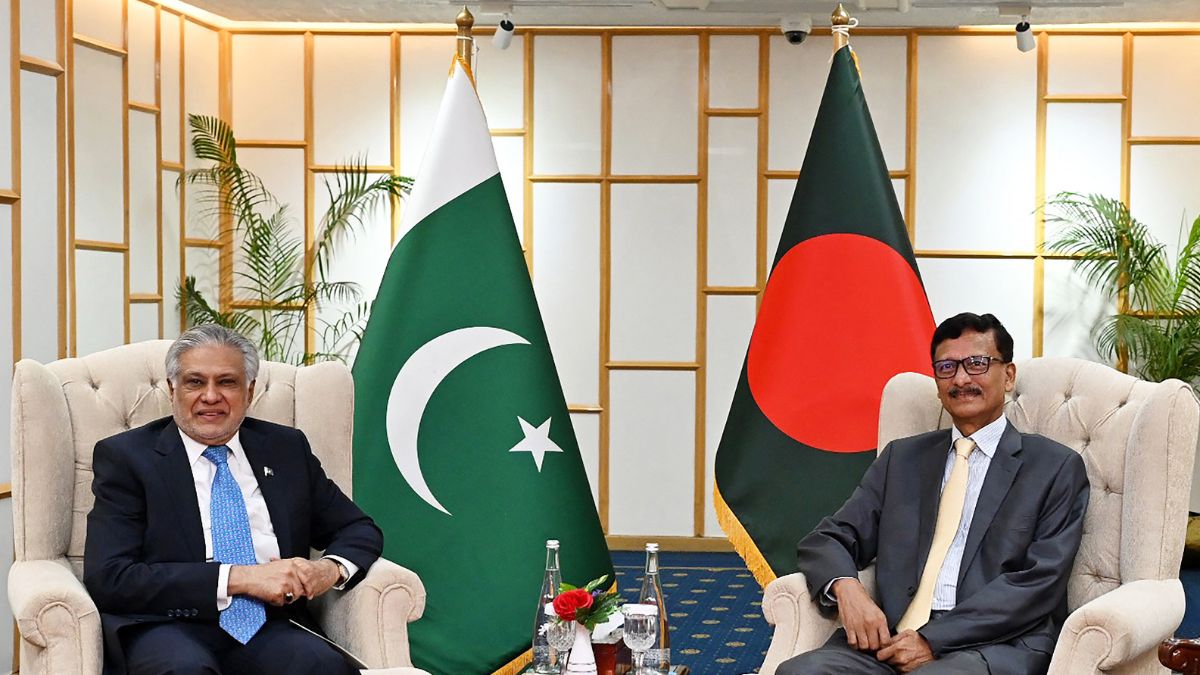Pakistan’s war crimes in East Pakistan (today’s Bangladesh) in 1971 remain a haunting memory between the two nations. Even as Islamabad and Dhaka get closer, the 1971 Bangladesh Liberation War looms large.
This was visible when Bangladesh flagged pending issues, including an apology for the 1971 war, during Pakistani Foreign Minister Ishaq Dar’s visit to Dhaka over the weekend. The issue of Pakistan taking accountability for the atrocities committed by the Pakistani military in 1971 has long been a bone of contention between the two countries.
Let’s take a closer look.
Bangladesh seeks Pakistan’s apology for 1971 war
Pakistan’s Foreign Minister Ishaq Dar met Bangladesh interim government’s Adviser on Foreign Affairs Touhid Hossain in Dhaka on Sunday (August 24). This was the first visit by a Pakistani foreign minister to Bangladesh in more than a decade.
“We have raised unresolved issues such as an apology or expression of regret for 1971, claims over assets, and the matter of stranded Pakistani citizens (with Dar),” Hossain told reporters after talks with the Pakistan FM, as per PTI.
Dar said Bangladesh should “clean” its heart and move forward by leaving the “unresolved issue” of Pakistan’s apology for the 1971 war.
“In 1974, that issue was resolved, and the document is historic and available in both countries. After that, General Musharraf came here and addressed this [issue] in a candid manner, and I think even Islam tells us to clean your hearts,” the Pakistan foreign minister said.
Dar indirectly mentioned the Tripartite Agreement of 1974 signed by Bangladesh, India and Pakistan. He also referred to the “regret” expressed by Pakistani General Musharraf during his 2002 visit to Dhaka.
However, Bangladesh is not satisfied with Pakistan’s overtures.
“We want accountability, reparations. We want Pakistan to express remorse and seek forgiveness for the mass killings that took place here," Hossain said.
This is not the first time that Dhaka has brought up the pending 1971 issues with Pakistan.
In April, during the first foreign secretary-level talks in 15 years, Bangladesh had urged Pakistan to resolve unsettled historical issues and finalise pre-independence asset sharing. Dhaka also called for a formal apology for Pakistan’s atrocities during the 1971 Liberation War.
Why 1971 war still haunts Pakistan-Bangladesh ties
On March 25, 1971, the Pakistan military began a brutal crackdown in Dhaka, East Pakistan (now Bangladesh). The official death toll of the nine-month-long Bangladesh Liberation War was estimated to be between 3,00,000 and 30 lakh people, while thousands of women were raped. This was one of the most heinous acts of genocide by Pakistani troops that began with Operation Searchlight, the bloody crackdown launched on the Bengali population of East Pakistan in March 1971.
In December that year, Pakistan launched a military offensive against India, leading to a third war between the two nations. It was this Indo-Pak War that led to the creation of a new country – Bangladesh. The fighting lasted 13 days with the surrender of the Pakistan Army on December 16.
The atrocities committed by the Pakistani military have tainted relations between Pakistan and Bangladesh for years.
Speaking to DW in 2021, author Anam Zakaria said that if the two countries want to make any “meaningful strides” to improve ties, Pakistan must “acknowledge the violence of 1971 as well as the political, economic and cultural discrimination prior to Bangladesh’s birth.”
She underlined that “owning up to the past” and issuing a formal apology for the 1971 war crimes will enable the two countries to “deepen” diplomatic and economic relations.
“Half a century later, Pakistan has not owned its past. Textbooks, museum exhibits and mainstream narratives continue to distort and erase history and a selective remembering and forgetting of the past has been institutionalised by the state,” Zakaria said.
“The denial and minimising of violence 50 years on is deeply painful for Bangladeshi survivors and their families. Pakistan’s acknowledgement is critical…Nations cannot simply erase their history and move on. Our past will continue to haunt our present unless we engage deeply and learn from it,” she added.
A proper apology yet to come
In 1974, Bangladesh, India and Pakistan signed a Tripartite Agreement to herald an era of peace and reconciliation in the subcontinent. Dhaka decided to drop the trials against 195 senior Pakistani military officers in Bangladesh on charges of war crimes in 1971.
This coincided with Pakistan’s apology for its army’s violence during the Bangladesh Liberation War.
As per New York Times (NYT), the agreement noted that the Pakistani government “condemned and deeply regretted any crimes that may have been committed.”
It further said that the then Pakistan Prime Minister Zulfikar Ali Bhutto had “appealed to the people of Bangladesh to forgive and forget the mistakes of the past in order to promote reconciliation.”
“Similarly, the Prime Minister of Bangladesh [Sheik Mujibur Rahman had declared with regard to the atrocities and destruction committed in Bangladesh in 1971] that he wanted, the people to forget the past and to make a fresh start,” it added.
Pakistan’s reluctance to issue a formal apology to Dhaka remains an obstacle in normalising relations, even as the two countries grow closer under the interim government in Bangladesh.
Ali Riaz, a political science professor at Illinois State University, told DW in 2021 that real progress between Islamabad and Dhaka “hinges on Pakistan’s unconditional apology for the 1971 war.”
“A better relationship requires Pakistan’s initiative to address the 1971 war, especially the genocide perpetrated by the army,” he said. “Unconditional public apology from Pakistan is long overdue … No nation can move forward without confronting its dark past.”
With inputs from agencies


)

)
)
)
)
)
)
)
)



